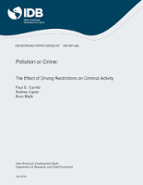Pollution or Crime: The Effect of Driving Restrictions on Criminal Activity
Date
Jul 2016
Driving restriction programs have been implemented in many cities around the world to alleviate pollution and congestion problems. Enforcement of such programs is costly and can potentially displace policing resources used for crime prevention and crime detection. Hence, driving restrictions may increase crime. To test this hypothesis, this paper exploits both temporal and spatial variation in the implementation of Quito, Ecuador's Pico y Placa program and evaluates its effect on crime. Both difference-in-difference and spatial regression discontinuity estimates provide credible evidence that driving restrictions can increase crime rates.



